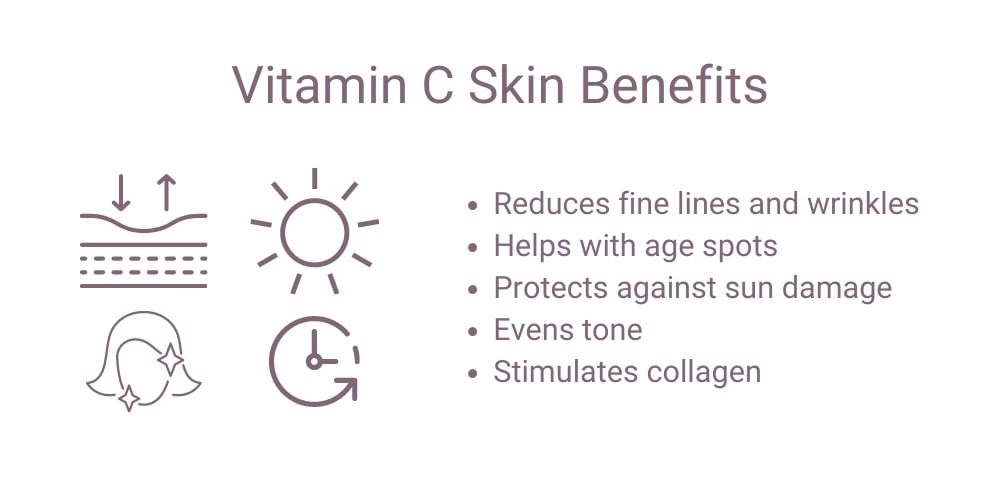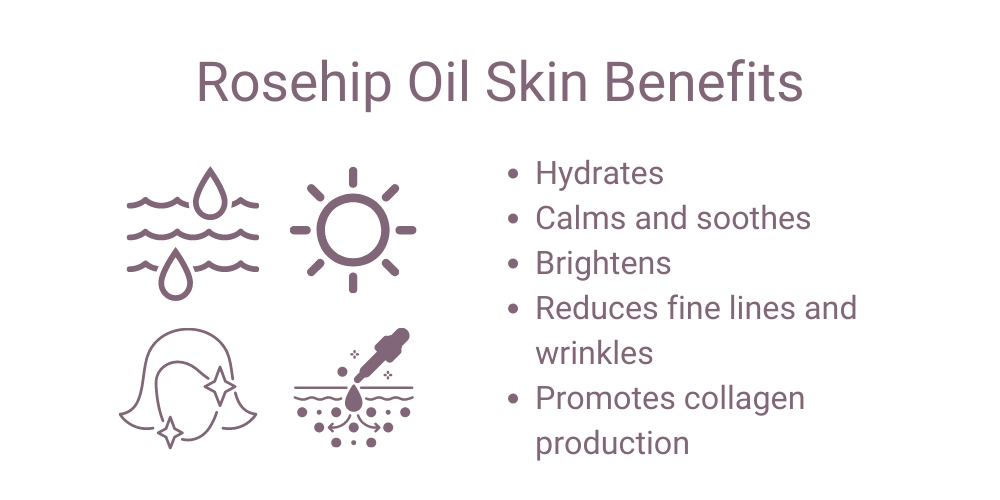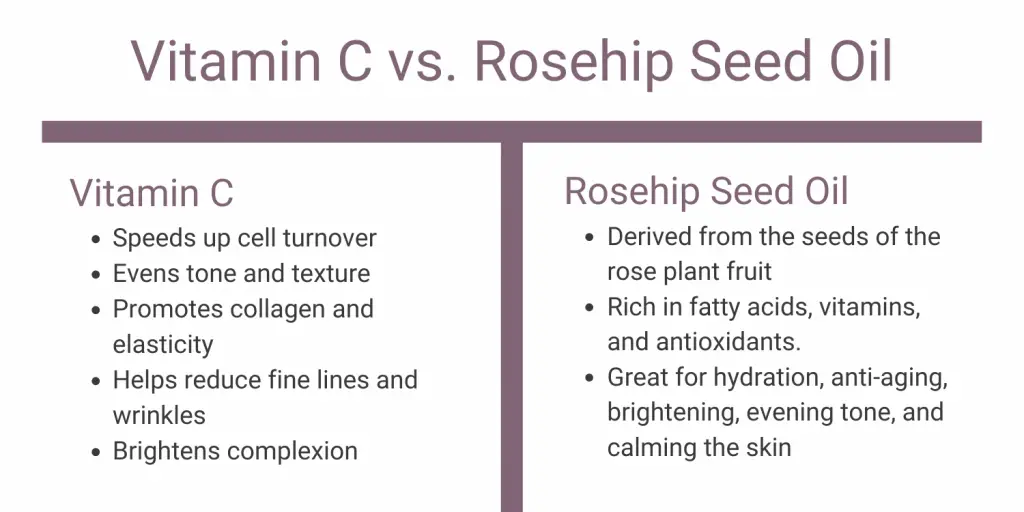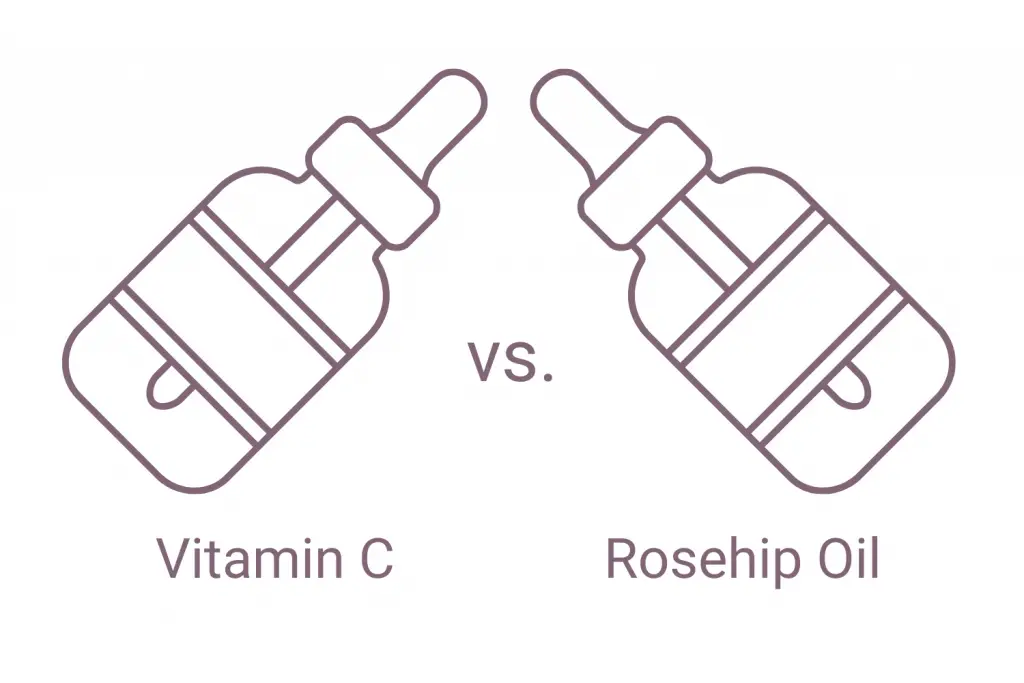There is a lot of confusion about the ingredients most commonly used in skincare: vitamin C and rosehip oil. However, there are plenty of pros and cons to using each component.
This post may contain affiliate links. Read the full disclosure here
This article will compare the two ingredients (vitamin C vs. rosehip oil) side by side in terms of their benefits and usage to help you decide which product to choose for your skincare routine.
What is Vitamin C?
Vitamin C is an essential acid found in all living organisms. More specifically, vitamin C is a water-soluble nutrient that can be found in food, such as bell peppers, citrus fruits, and tomatoes. Its benefits for skin include improved firmness and elasticity, wrinkle reduction, hydration levels, and prevention of free radical damage.

While it does provide several benefits for the skin, it also has some drawbacks. Vitamin C oil is very potent and is generally not recommended for sensitive skin. However, it has substantial benefits for those who suffer from acne, rosacea, and eczema.
When it comes to skincare, vitamin C is an antioxidant that helps protect the skin from the damaging effects of environmental factors. This includes sun damage, pollution, and smoking.
Vitamin C also helps reduce redness in the skin resulting from UV exposure. Its antioxidants prevent free radicals from causing damage to cells in the body and potentially leading to cancer or other diseases.
As an oil, vitamin C delivers a long-lasting effect. This serum works by hydrating the skin and helping to produce collagen and elastin, which decreases wrinkles over time. These characteristics make vitamin C oil an essential ingredient in any anti-aging beauty regimen.
Vitamin C is used in a variety of skincare products, such as serums, lotions, and balms. Vitamin C-based serums contain other beneficial ingredients for skincare, such as aloe vera, shea butter, and pure vitamin C.
Vitamin C Skin Benefits
Vitamin C is an essential skincare ingredient in your daily routine. It plays a vital role in the health and appearance of the skin. However, different products need different levels of vitamin C to perform optimally. This means it’s important to know which product to use for your specific skincare regimen.
- Promotes collagen production
- Supports skin repair
- Reduce appearance of fine lines and wrinkles
- Brightens complexion
- Even tone and texture
- Reduce the appearance of dark spots and hyperpigmentation
- Prevent premature aging.
Topical vitamin C is used as an antioxidant and a natural moisturizer. It helps prevent dryness and premature aging caused by sun exposure or environmental factors like wind or chlorine exposure that may degrade collagen production.

You should use topical vitamin C if you want a higher concentration of vitamin C product while using skin care products (i.e., lotions, serums, etc.) with a lower amount of it. However, if you have sensitive skin, using a topical vitamin C oil in addition to your vitamin C-based products will likely be too potent. Contact a dermatologist if you are unsure what level of potency your skin requires.
What is Rosehip Oil?
Rosehip seed oil is a natural oil extracted from the seeds of wild roses. It is extremely popular in the skincare industry and has been around for centuries.

Roses are known to be one of the best sources of nutrients, antioxidants, and vitamins. They contain potent ingredients that can prevent skin aging, restore collagen, and remove wrinkles. This makes rosehip oil an excellent choice for many people who want to live a healthy lifestyle.
Rosehip seed oil is also widely used as an organic treatment for varicose veins, eczema, sunburns, and insect bites.
Rosehip oil, made from the rosehip fruit, is a facial oil that has been gaining popularity in recent years. Rosehips are packed with nutrients and antioxidants like vitamin A, B1, B6, and E, which help in keeping your skin healthy. This is due to their rich flavonoids content, which helps protect cells from free radical damage.
Rosehip oil has become extremely popular in recent years. However, it has been used for centuries to promote many different health benefits. It helps reduce inflammation, is a natural remedy for skin conditions, and can help with cellulite, stretch marks, acne, wrinkles, and hair loss.
Rosehip Oil Benefits
Rosehip oil is rich in antioxidants, vitamins, and minerals, which help in maintaining healthy skin.

It can also be used for a variety of other things, such as applying it to under the eyes to reduce dark circles and blemishes, applying it to the hair to make it shine, or mixing some drops with your favorite face moisturizer for additional hydration.
The benefits of rosehip oil are endless, but here are our five favorites:
- The high vitamin content of rosehip oil helps promote collagen production and repair.
- Rosehip oil moisturizes and repairs skin by penetrating deep into pores and restructuring cells from the inside out.
- It contains high levels of essential fatty acids, vitamin C, antioxidants, and a high concentration of linoleic acid, which helps improve skin condition along with improving elasticity.
- Rosehip oil can be used to treat eczema, acne, and psoriasis. There is also evidence that it can reduce wrinkles and scars caused by acne.
- Rosehip oil is excellent for promoting long-term hydration (especially in dryer seasons such as winter).
More rosehip oil comparisons you might like:
- Rosehip Oil vs. Hyaluronic Acid
- Rosehip Oil vs. Squalane
- Rosehip Oil vs. Marula Oil
- Rosehip Oil vs. Argan Oil
- Rosehip Oil vs. Retinol
Vitamin C vs. Rosehip Oil
Many people are in a constant quest for better skincare products. Both vitamin C oil and rosehip oil have their benefits and uses for skincare, but which is better? Like most things in life, “better” depends on your specific needs.

Many people believe that vitamin C has more benefits than rosehip oil.
Vitamin C can help fight signs of aging, improve skin tone, boost collagen production while reducing the appearance of fine lines and wrinkles.
Rosehip seed oil contains fatty acids that are good for the skin, Vitamin C, which helps create collagen; vitamin A, which prevents wrinkles; and antioxidants that fight free radicals. The most important way to use rosehip oil is to apply it to the face twice a day or before and after sun exposure.
Why use vitamin C if rosehip oil contains vitamin C?
Pure vitamin C has far more concentrated amounts of vitamin C than rosehip oil. Additionally, some studies have been done which suggest that the potency of vitamin C in rosehip oil is negligible.
Similarities
As you can see, vitamin C and rosehip oil have a lot of overlap in their benefits. Both:
- Support collagen production
- Improve hyperpigementation
- Reduce fine lines and wrinkles
- Reduce the appearance of scarring
- Help fight free radicals
- Improve anti-aging regimens
Differences
The significant differences between vitamin C and rosehip oil lie in when a person begins seeing results:
Vitamin C shows results more quickly because of its potency.
Rosehip oil is slow-acting in comparison because it is not as concentrated as vitamin C oil. This makes rosehip oil perfect for delicate or sensitive skin because it gently moisturizes and improves collagen repair over time. The additional nutrients, such as vitamin A, E, and natural fatty acids, also give the skin more balanced nutrition.
One other significant difference is that rosehip oil is excellent for minimizing the appearance of stretch marks. It can even be used as a preventative treatment when applied to areas of skin that are generally prone to stretch marks.
Which is Better: Vitamin C or Rosehip Oil?
Vitamin C oil is a versatile skincare product that can be used for most skin types. It has lightening properties and is an effective moisturizer. Vitamin C oil is an effective way to moisturize your skin and improve its overall tone. If you have oily, acne-prone, or dry skin, you should consider using this product.
Vitamin C oil also provides benefits that include anti-aging properties, brightening dull skin tone, lightening dark spots, revitalizing tired or stressed-out skin as well as improving elasticity and overall hydration levels in the skin.
Avoid vitamin C oil if you have sensitive or delicate skin.
Rosehip oil is a multi-purpose oil. It has been used for centuries to moisturize dry, irritated, and sensitive skin due to its skin smoothing, lightening, and hydrating properties.
Its moisturizing properties are due to its high content of essential fatty acids like linoleic acid, linolenic acid, alpha-linolenic acid, and oleic acid. Rosehip also has an anti-inflammatory ability that helps prevent eczema flare-ups and acne flares. The antioxidant properties in this oil help fight free radicals that may cause premature aging.
Expect the best results when using rosehip oil for sensitive skin types, dry or mature skin, or people with rosacea.
Vitamin C and Rosehip Oil Together
Vitamin C oil is one of the most popular ingredients in skincare. Its natural antibacterial properties can help fight skin infections, provide a long-lasting moisture boost for the skin, reduce dark circles and fine lines, encourage collagen production, and reduce acne breakouts.
Rosehip oil is another popular ingredient in skincare that has been shown to improve the appearance of the skin by reducing the appearance of wrinkles and blemishes. It also provides hydration and antioxidants, which help promote healthy cell turnover.
Overall, vitamin C oil and rosehip oil are similar in their general benefits. Both are:
- Antioxidants
- Acne treatments
- Free-radical fighters
- Collagen repair agents
- Powerful moisturizers
- And anti-aging agents
The most significant difference between these oils is the speed at which you will see results. Vitamin C is more fast-acting due to its concentration and potency. Rosehip oil is a better choice for those with sensitive skin and will gently and gradually repair the skin as opposed to its vitamin C counterpart.
For the best of both worlds, a person with non-sensitive skin could choose a regimen that employs both vitamin C and rosehip oil. Either way, both ingredients are potent influences in creating healthy, moisturized skin. The choice between which is better comes down to personal preference and skin needs.





